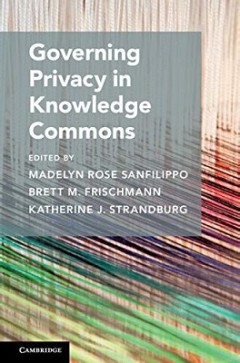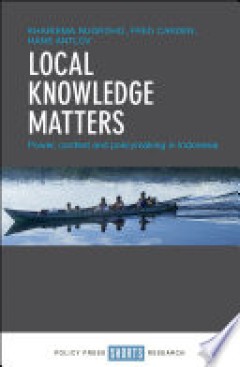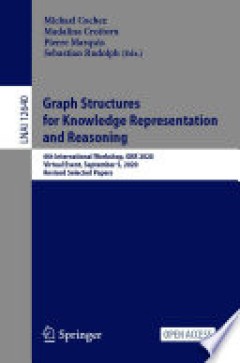Filter by
# Debug Box
/var/www/htdocs/pustaka-digital/lib/SearchEngine/SearchBiblioEngine.php:688 "Search Engine Debug 🔎 🪲"
Engine Type ⚙️: "SLiMS\SearchEngine\SearchBiblioEngine"
SQL ⚙️: array:2 [ "count" => "select count(sb.biblio_id) from search_biblio as sb where sb.opac_hide=0 and ((match (sb.topic) against (:subject in boolean mode)))" "query" => "select sb.biblio_id, sb.title, sb.author, sb.topic, sb.image, sb.isbn_issn, sb.publisher, sb.publish_place, sb.publish_year, sb.labels, sb.input_date, sb.edition, sb.collation, sb.series_title, sb.call_number from search_biblio as sb where sb.opac_hide=0 and ((match (sb.topic) against (:subject in boolean mode))) order by sb.last_update desc limit 10 offset 0" ]
Bind Value ⚒️: array:1 [ ":subject" => "'+\"knowledge\"'" ]

Principles of knowledge auditing: foundations for knowledge management implem…
A comprehensive theoretical and practical guide to the operating principles of knowledge auditing, illustrated with numerous case studies. A knowledge audit provides an “at a glance” view of an organization's needs and opportunities. Its purpose is to improve an organization's effectiveness through a better understanding of the dynamics and levers of knowledge production, access, and use…
- Edition
- -
- ISBN/ISSN
- 9780262373166
- Collation
- xi, 410 p : ill.
- Series Title
- -
- Call Number
- 658.4038 LAM p
Open knowledge institutions: reinventing universities
In this book, a diverse group of authors—including open access pioneers, science communicators, scholars, researchers, and university administrators—offer a bold proposition: universities should become open knowledge institutions, acting with principles of openness at their center and working across boundaries and with broad communities to generate shared knowledge resources for the benefit…
- Edition
- -
- ISBN/ISSN
- 9780262365154
- Collation
- xi, 177 p. : ill
- Series Title
- -
- Call Number
- 378.101 MON o

Planning and analyzing teaching: using the variation theory of learning
Using illustrative teaching case studies, this book demonstrates how teaching informed by a learning theory, specifically variation theory, can equip teachers to facilitate possibilities for students' learning in effective and powerful ways. For a long period of time teaching has been "black-boxed", in favour of other explanations of why students learn or not, such as motivation and social inte…
- Edition
- -
- ISBN/ISSN
- 9781003194903
- Collation
- xiii, 103 pages; illustration
- Series Title
- -
- Call Number
- 371.102 KUL p

Governing privacy in knowledge commons
Privacy, in contrast with secrecy, is a relational concept, achieved when personal information is shared appropriately between actors. Viewed in this way, privacy is necessarily contextual and complex because norms about appropriate flows and use of personal information are socially negotiated and often contested. (Nissenbaum, 2009) Privacy is thus a problem of collective action. Moreover, pers…
- Edition
- -
- ISBN/ISSN
- 9781108749978
- Collation
- xi, 289 pages; illustration
- Series Title
- Cambridge studies on governing knowledge commons
- Call Number
- 342.08 SAN g

Higher education institutions and digital transformation: building university…
"The growing complexity, fluidity and instability of the environment as well as changing needs are challenges that both enterprises and higher education institutions must face. Higher education institutions understand that their key product, i.e. knowledge, is a value that can and should be offered to enterprises in a desirable form as a key to innovation and development as well as the basis of…
- Edition
- -
- ISBN/ISSN
- 9781003363132
- Collation
- xii, 222 pages : illustrations ; 24 cm.
- Series Title
- Routledge open business and economics
- Call Number
- 378.1 LIS h

Actions of Their Own to Learn : Studies in Knowing, Acting, and Being
What does it mean to take actions of one’s own to learn? How do human beings create meaning for themselves and with others? How can learners’ active efforts to build knowledge be encouraged and supported? In this edited compilation, scholars from a diverse range of academic and professional backgrounds address these questions, grounded in the conviction that the ability to take effective ac…
- Edition
- -
- ISBN/ISSN
- 9789463512008
- Collation
- 284 p
- Series Title
- -
- Call Number
- 371.3 IRO A

Local knowledge matters
Available Open Access under CC-BY-NC licence. This book explores the critical role that local knowledge plays in public policy processes as well as its role in the co-production of policy relevant knowledge with the scientific and professional communities. The authors consider the mechanisms used by local organisations and the constraints and opportunities they face, exploring what the knowledg…
- Edition
- 16
- ISBN/ISSN
- 9781447348085
- Collation
- III, 192 p
- Series Title
- -
- Call Number
- 320.609598

Integrating Immigrants in Europe
Europe has become a continent of immigration in the course of the last half century, and European societies have experienced growing ethnic and cultural diversity. Governmental actors have often made great efforts to collect and develop the knowledge and expertise to understand integration processes and to control and steer these. Major differences, however, exist between European countries in …
- Edition
- 1
- ISBN/ISSN
- 9783319162560
- Collation
- VIII, 343p
- Series Title
- IMISCOE Research Series
- Call Number
- 304.8 EDU s

Graph structures for knowledge representation and reasoning : 6th internation…
This open access book constitutes the thoroughly refereed post-conference proceedings of the 6th International Workshop on Graph Structures for Knowledge Representation and Reasoning, GKR 2020, held virtually in September 2020, associated with ECAI 2020, the 24th European Conference on Artificial Intelligence. The 7 revised full papers presented together with 2 invited contributions were revie…
- Edition
- -
- ISBN/ISSN
- 9783030723088
- Collation
- IX, 151 p
- Series Title
- -
- Call Number
- 006.332 MIC g

Wikipedia and the representation of reality
A contemporary examination of what information is represented, how that information is presented, and who gets to participate (and serve as gatekeeper) in the world's largest online repository for information, Wikipedia. Bridging contemporary education research that addresses the 'experiential epistemology' of learning to use Wikipedia with an understanding of how the inception and design of th…
- Edition
- -
- ISBN/ISSN
- 9781003094081
- Collation
- xviii + 122 p
- Series Title
- -
- Call Number
- 030 ZAC w
 Computer Science, Information & General Works
Computer Science, Information & General Works  Philosophy & Psychology
Philosophy & Psychology  Religion
Religion  Social Sciences
Social Sciences  Language
Language  Pure Science
Pure Science  Applied Sciences
Applied Sciences  Art & Recreation
Art & Recreation  Literature
Literature  History & Geography
History & Geography